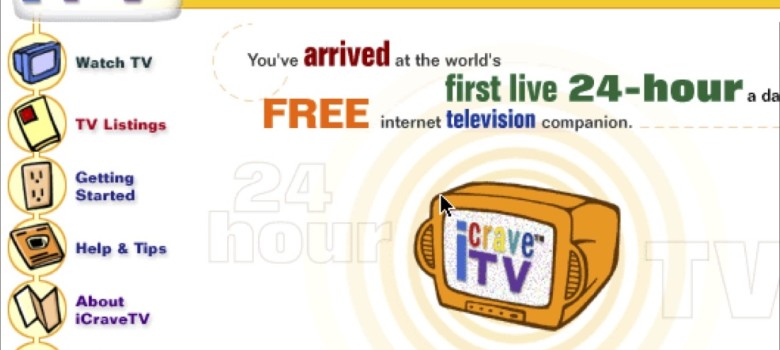Before there was Youtube, Hulu, Netflix, and broadcasters streaming their content on the Internet, there was iCraveTV. iCraveTV, a Canadian-based start-up, launched in November 1999, by streaming 17 over-the-air television channels on the Internet. The picture was small, connection speeds were slow, but the service was streaming real-time television years before it became commonplace. The company relied upon two Canadian laws to provide the service: the Copyright Act, which contains a provision permitting retransmission of broadcast signals subject to certain conditions, and the CRTC’s New Media Exemption order, which excluded new media broadcasters from regulation.
The company faced an immediate legal fight from Hollywood and broadcasters. Within months of launching, the service shut down. U.S. demands for Canadian law reform ultimately led to changes to the Copyright Act, which effectively excluded “new media retransmitters” from taking advantage of the retransmission provision.
iCraveTV is long forgotten for most Internet users, but the legal framework that ultimately emerged was invoked this week by the CRTC in Canada’s leading net neutrality case.
At issue is whether companies such as Bell are violating Canada’s Internet traffic management practices (also referred to as net neutrality guidelines) due the different treatment of Internet video on services such as Bell Mobility. The original complaint noted that the cost of watching a service such as Netflix is different from watching Bell Mobile TV because of different ways of treating the data that is used (the Bell Mobile TV data is exempted from the monthly data cap). The case has now been expanded to include other providers.
Bell has argued that the case is not a telecom case (and therefore subject to the traffic management rules), but rather a broadcast matter that qualifies under the new media exemption. This week, the CRTC sent a series of questions to Bell (as well as Rogers and Videotron). The very first question invokes the iCraveTV legal framework:
Given that you have indicated in your submissions that the Mobile TV App operates under the terms of the Digital Media Broadcasting Undertaking Exemption Order, it would appear that you would be unable to make use of the retransmission regime set out in the Copyright Act. In light of this, please describe in detail the following:
a. Which rights you obtain to broadcast live television channels on Mobile TV App; and
b. Whether subscribers to Mobile TV App receive any local, regional or distant channels, and if so how you determine what constitutes local, regional or distant for that subscriber.
In plain language, the post-iCraveTV framework means that services can’t both rely on the Copyright Act retransmitter provision and the CRTC’s new media exemption order. If the retransmitter relies on the Copyright Act, it will be subject to regulation under the Broadcasting Act. Alternatively, if the service is excluded from Broadcasting Act regulation by qualifying under the new media exemption, it cannot rely on the Copyright Act provision and must obtain licenses to avoid copyright infringement claims.
The CRTC notes that Bell says it is relying on the new media exemption for its Mobile TV service. Leaving aside the bigger question on whether the service should be viewed as telecom or broadcast, Bell’s response suggests that it must have licensing arrangements for the channels it carries, otherwise the retransmission infringes copyright. The Bell Mobile TV service includes several over-the-air channels such as the CBC and CITY-TV and the CRTC wants to know more about the licensing deals that presumably exist to allow Bell to retransmit those channels through its service.








Really glad that the CRTC is taking this approach. It’s been frustrating watching the BDU’s straddle the fence, claiming whichever legal framework is most advantageous when it’s about them, and trying to throw the less advantage framework at other services when it’s not.
It’s especially important as the BDU’s all expand into more and more new media services – as the potential for net neutrality abuse is just going to grow exponentially, so precedents are going to be increasingly important.
You forgot about Nabu in Ottawa! Gaming-on-demand in the mid-80s. It was awesome, but slow because it too suffered from being throttled.
http://en.wikipedia.org/wiki/NABU_Network
Pingback: News of the Week; August 13, 2014 | Journalism Media Law
I am agree thanks yaour sharing . visit back my web https://sites.google.com/site/rppsimulasidigital/
I like your article, god job frends , visit back http://lilik-ernawati.com/rpp-dan-materi-simulasi-digital-kurikulum-2013-kelas-x/